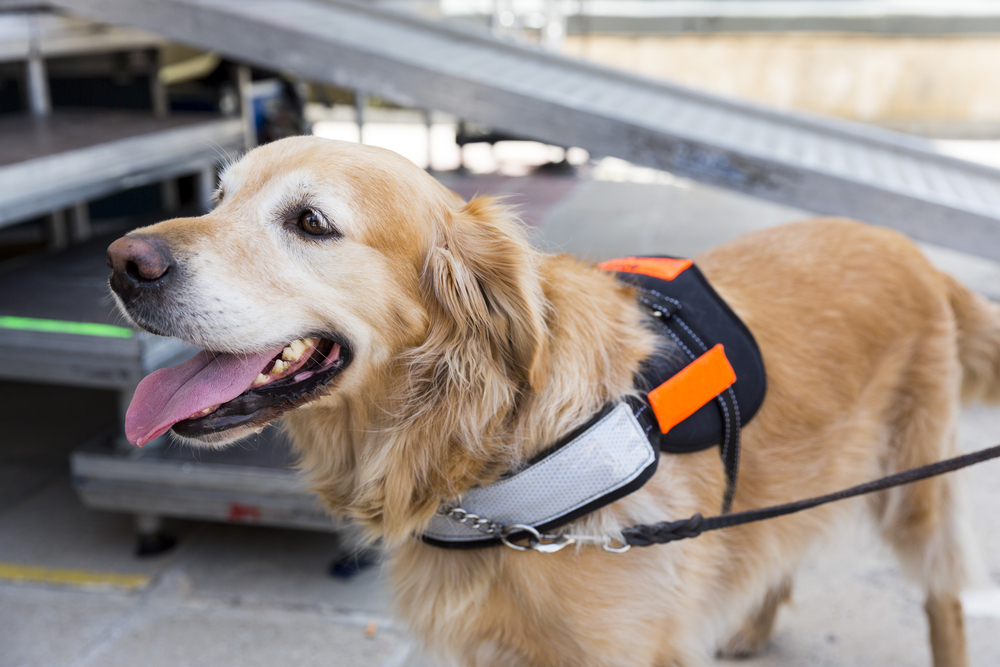In this article
Service dogs are a necessity for hundreds of thousands of people with disabilities. With service dogs, people who might have certain limitations that interfere with daily life gain more freedom and stay safer. Unfortunately, there has been a trend as of late where people who do not have disabilities are claiming their canines are service dogs, and people with emotional support animals are falsely claiming these are service dogs.
Fake service animals damage the integrity of real service dogs and make it more difficult for the people who legitimately need service animals. That’s why many states have begun creating laws around fake service dogs. But what about Florida? Are there Florida service dog laws?
Florida is indeed one of the states to have a law on the books about the fake service dog trend. Here’s what to know.

What Does a Real Service Dog Do?
Legit service dogs go through hundreds of hours of training to be able to do what they do. And what they do is help people with disabilities improve the quality of their lives. Some dogs are trained to help people with vision problems, while others work with those with mobility issues. Service dogs may be an aid to someone with autism or a veteran with PTSD. Some service dogs even detect changes in blood sugar levels for people with diabetes! Service dogs can have myriad jobs.
These working canines are also allowed in places most dogs aren’t due to the jobs they do for people who can’t do these jobs themselves. Service dogs are permitted in most public places, including restaurants and libraries.

What Is a Fake Service Dog?
Because of the increase in the recognition of service dogs, some people are now claiming that dogs are service animals even though they haven’t completed any service animal training. There’s a market for items such as counterfeit certifications, IDs, and vests for service dogs that continues to grow. However, the Americans with Disabilities Act (ADA) states that service animals do not need to have identifying items, like vests.
Why are people suddenly claiming that non-service dogs are service animals? In many cases, people want to bring their dog into a public place where it wouldn’t typically be allowed, have their dog live with them in an apartment or other rental that doesn’t usually permit pets, or avoid paying extra fees for things like traveling with a canine.
And, in some cases, people who have emotional support animals (ESAs) get confused and believe their ESA is a service dog. However, ESAs and service dogs are two entirely different things, and ESAs don’t have the same rights as service animals because they haven’t undergone any certification or additional training.
What Do Florida Service Dog Laws Say?
What do Florida service dog laws have to say about fake service animals? According to § 413.08(9), Fla. Stat. (2023), “A person who knowingly and willfully misrepresents herself or himself, through conduct or verbal or written notice, as using a service animal and being qualified to use a service animal or as a trainer of a service animal commits a misdemeanor of the second degree, punishable as provided in s. 775.082 or s. 775.083 and must perform 30 hours of community service for an organization that serves individuals with disabilities, or for another entity or organization at the discretion of the court, to be completed in not more than 6 months.”
So, the penalty for claiming your pet or ESA is a service dog when it isn’t would be a possible jail sentence (no longer than 60 days) and a $500 fine, along with the aforementioned 30 hours of community service.
That’s the only law on the books regarding fake service animals in Florida. When it comes to real service dogs, Florida law follows ADA guidelines.

The Impact of Fake Service Dogs
Of course, the most significant impact of people pretending their dog is a service animal is on people with disabilities who require the aid of real service dogs. Fake service dogs obviously haven’t had the training real ones have obtained, which can lead to real service dogs having to deal with hostile environments, more scrutiny, and distrust. This harms those people using actual service dogs, potentially making their lives more difficult.
There are also public safety concerns when it comes to fake service dogs. You might believe your pet is the most well-behaved dog in the world, but even well-behaved dogs can be dangerous in public. Imagine a scenario where your dog is in public and has been frightened by something; as a result, they could act aggressively towards others around you or even harm themselves or others.
The welfare of your dog is at stake, too. Being forced into situations they haven’t been trained to handle, like having lots of people around, can cause anxiety and stress in canines. You may believe that having your dog go everywhere with you is fantastic, but your pet may not feel the same way.

Closing Thoughts
People claiming their pets and ESAs are service dogs has become a growing trend, but it really shouldn’t be a trend at all. Fake service dogs harm many people and animals, plus you risk experiencing legal ramifications for lying about having a service dog. In Florida, it could lead to jail time, fines, and community service. Respect the hard work service dogs do and the people who need them, and don’t claim a dog is a service animal if they aren’t!
Featured Image Credit: Belish, Shutterstock























2 Responses
Lawbreakers,no matter the severity anymore do not care. Thankfully the coming Kingdom will not have any of this to deal with!
Hi Steven,
Thank you for sharing your thoughts. It’s clear you care deeply about fairness and doing the right thing, and you’re not alone in feeling frustrated when people take advantage of systems meant to help others.
The issue of fake service dogs is definitely an emotional one, and we appreciate you taking the time to comment on it. At Dogster, we always encourage respectful discussion and awareness about responsible pet ownership and following the law.
Have a great day!